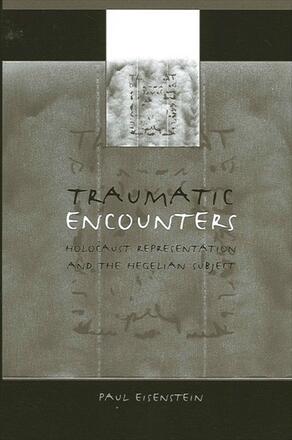
Traumatic Encounters
Holocaust Representation and the Hegelian Subject
Alternative formats available from:
Addresses the difficulty of representing the Holocaust in literature and on film.
Description
Traumatic Encounters argues for an alternative memorial path in Holocaust and cultural studies—one that shows the vital necessity of thinking in a universal way about an event like the Holocaust. Relying on Hegel's notion that the particular is already universal, Eisenstein shows how the encounter with trauma transpires not in the refusal of a universalizing gesture but rather in its wholesale embrace. This embrace results in a recognition involving the trauma that conditions the possibility of history in the first place—a structural trauma immune to historicization that Hegel and psychoanalysis place at the heart of subjectivity and community. This encounter with structural trauma is at the center of four titles that Eisenstein examines: Spielberg's Schindler's List, D. M. Thomas's The White Hotel, Thomas Mann's Doctor Faustus, and David Grossman's See Under: Love
Paul Eisenstein is Associate Professor of English at Otterbein College.
Reviews
"Traumatic Encounters is an engaging and erudite study that will be of much use for scholars from a variety of disciplines. " — H-Net Reviews (H-German)
"Eisenstein's emphatic commitment to a conscientious return-to-self … protects against a tendency for the thinking, acting, suffering self to be completely effaced by the enormity of collective atrocity. " — College Literature
"…helpfully unsettles some of our most entrenched assumptions. " — Journal of Jewish Studies
"The 'traumatic encounter' from the book's title is not that of the Holocaust, but the one between two seemingly incompatible events: the Holocaust and Hegelian dialectics. The result is simply shattering: both terms undergo a profound transformation. Gone is the image of Hegel as the great idealist reconciliator who washes away all traumatic cuts; gone is the easy 'Holocaust-industry' manipulation of the ultimate crime of the twentieth century. This alone makes the book a must: a forceful redemption of the power of theory. " — Slavoj Zizek
"An exceptionally ambitious and timely intervention into contemporary discussions about the ethics of representation after the Holocaust. " — Wulf Kansteiner, Binghamton University, State University of New York
"Traumatic Encounters offers an innovative (Zizekian/Lacanian) approach to the Holocaust in literature and provides significant insight into an interesting selection of important texts. " — David Brenner, Chair of Jewish Studies, Kent State University